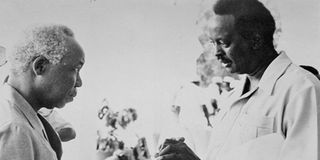THE SOJOURNER : Students discuss Mwalimu Nyerere legacy and self-reliance policy

President Julius Nyerere listens to then Prime Minister Edward Sokoine. PHOTO | FILE
What you need to know:
- No wonder along the congested business streets in this dusty town one will come across businessmen from all these African countries collecting goods for their home markets. The central market is a beehive of all types businesses and one can literally purchase anything be it construction materials, clothing, food products, beauty products, cooking oils, shoes and the like, wholesale or retail.
Last Saturday, I was attending to some small errands in the busy town of Makambako, the busy junction of all traffic heading to Mbeya and onward to Zambia, Malawi and Congo DRC, as well as traffic to Songea and off course to Iringa, Dodoma, Morogoro and Dar es Salaam.
No wonder along the congested business streets in this dusty town one will come across businessmen from all these African countries collecting goods for their home markets. The central market is a beehive of all types businesses and one can literally purchase anything be it construction materials, clothing, food products, beauty products, cooking oils, shoes and the like, wholesale or retail.
So I was loitering around these business joints when I got a call from my friend and village-mate Ambassador Gordon Ngilangwa, now retired, informing me that that same afternoon the newly established Wanging’ombe District authorities were organising Nyerere Day.
He further explained that the commemoration event will take place at the seat of the new district, Igwachanya, that same afternoon. He had been invited by the Wanging’ombe District Commissioner, popularly named Comrade Ally Kasinge, and he was passing the same invitation to me.
I immediately reorganised my schedule as Igwachanya is about 30 kilometres from Makambako. I hurriedly finished my business and drove my contraption through some interestingly named villages including Mng’elenge, Uhambule, Soliwaya, Kanamalenga, and Idindilimunyo and arrived in time for the event.
Inside a half finished conference hall, was an interesting cross section of enthusiastic residents of the area eager to brainstorm on the legacy of Mwalimu Nyerere, under the title ‘19 years without Nrerere, some overview on Education and Industrialisation.’
Inside this hall were hundreds of pupils from four secondary schools – Wanike, Wanging’ombe, Kidugala Lutheran Seminary and Igwachanya itself. Also in attendance were religious leaders, government officials, led by none other than Comrade Kasinge himself, representatives of the police and armed forces, journalists, teachers, elders and local government leaders as well as village farmers and members of the public.
The main speakers were Ambassador Ngilangwa himself, Farida Nurdin, a politician and John Wihala, an agricultural expert. The moderator was Demetrio Kambanyuma Mgeni, an education guru in the district.
What struck me first was the realisation that, all major events connected with this Nyerere Day are usually organised by ‘Kigoda cha Nyerere’ and the attendant Butikus, academicians, political leaders and the like and in Dar es Salaam. In a few instances some varsities do organise the same.
But here in this remote district head office, whose new office windows are yet to even be curtained, was an inspirational event commemorating the same. And the discussions did not disappoint.
The speakers analysed the legacy of Mwalimu Nyerere in the field of education and industrialisation in the country. And how he had put in place measures to ensure all sons and daughters of the newly independent Bongoland had access to free education and how he had spearheaded the industrialisation process.
But it was Ambassador Ngilangwa who dwelt on the need to protect student girls from unnecessary pregnancies. The society, if it is to live up to Nyerere’s ideals, needed not only to punish the girls who get pregnant in school but those who impregnate them. “If 25 girls are expelled from school due to pregnancy, we should also see 25 boys or men prosecuted and sent to Mpechi – the regional prison – for the same.”
But the day went to the voices of the pupils themselves, all who were born after Nyerere’s death, who urged the authorities to reintroduce the spirit of self reliance, which was among Mwalimu’s key policies. They said they needed to learn, apart from the normal subjects, carpentry, masonry, home craft, sewing, cooking, modern farming, animal husbandry and similar skills while in school.
This would enable them to come out fully prepared to meet the many challenges of life in Bongoland. I think Mwalimu must be smiling in his grave on account of these voices.
It was pleasing to hear Comrade Kasinge promise that this will be an annual event in the district – that is whether he is still the governor of the district or not. I left feeling delighted that indeed Nyerere laid a firm foundation even among children who were born after his death.




